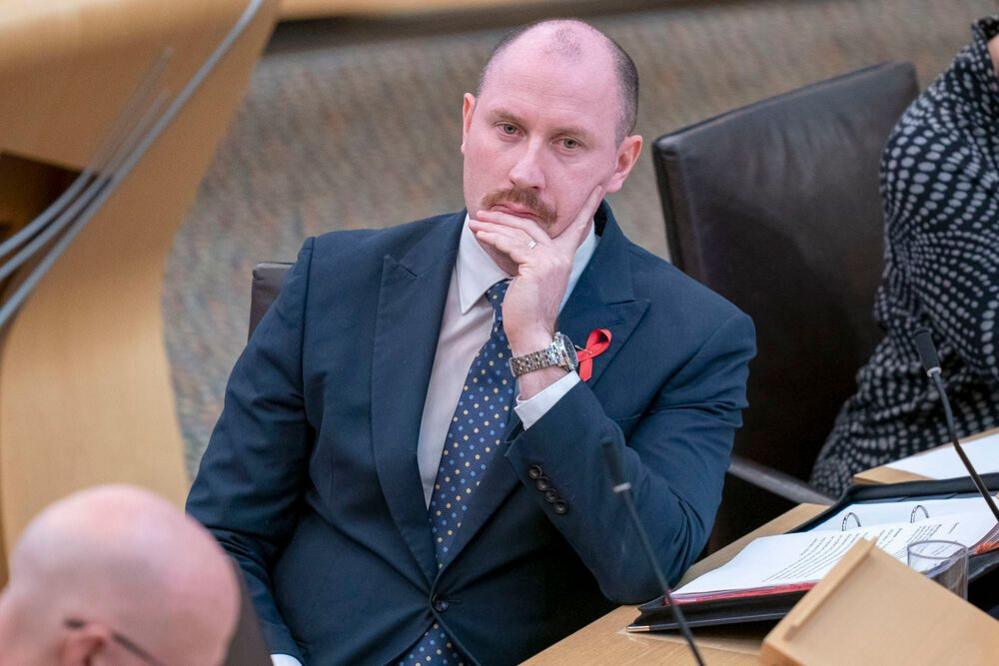Scottish NHS reform 'urgently needed' - watchdog

- Published
"Difficult decisions" may need to be made about whether some services can continue to be provided by the NHS in Scotland, a spending watchdog has warned.
A review by Audit Scotland said a clear plan was lacking - and that fundamental change in how NHS services are provided is "urgently needed" to cope with growing demand.
The annual report into the health sector found that, despite increased spending and staffing in the NHS, Scotland is seeing fewer patients than before the Covid-19 pandemic.
Health Secretary Neil Gray said the government did have a plan, which aimed to shift the focus towards preventative care.
He told BBC Radio's Good Morning Scotland: "The plan is to shift the balance of care from the secondary services where we're currently seeing extremely high demand in to more preventative primary care, so investing in GPs surgeries, pharmacies and optometrists to ensure people are treated earlier.
"We recognise that for too many people, they're waiting for too long and there needs to be fundamental reform of the way our health service is delivered."
Delivering safe care a 'challenge' in A&Es, doctor warns
- Published4 October 2024
NHS unable to meet growing demand, warns watchdog
- Published22 February 2024
The report highlighted that Scottish government commitments to reduce waiting lists and times have been missed and that delayed discharge figures are at their highest on record.
It added that NHS initiatives to improve productivity and patient outcomes have yet to have an impact, and they lack clear progress reporting.
Stephen Boyle, auditor general for Scotland, said action was needed to tackle waste within the NHS, with existing services reviewed to see if they are effective.
When asked what services could be cut, he suggested less effective drug treatments but said it would require tough choices by medical experts.
He said: “Difficult decisions are needed about making services more efficient or, potentially, withdrawing those services with more limited clinical value to allow funding to be re-directed.
"Taking those steps will require greater leadership from Scottish government and NHS leaders than we’ve seen to date.”

Health Secretary Neil Gray said there was a plan for healthcare reform
The health secretary said the pandemic had caused backlogs which meant that people were arriving in hospital with more progressed and complex issues.
He said "significant activity" to combat this was under way with a £30m investment.
Mr Gray added: "This will see around 12,000 additional new outpatient appointments, around 12,000 additional inpatient/day-case procedures and over 40,000 diagnostic procedures delivered.
"This year we are providing more than £19.5bn for health and social care and under this government funding for the NHS has increased in real terms by 30%."
Health remains the single biggest area of government spending in Scotland, with around 40% of the Scottish budget being spent on it.
In 2023/24, £19.1bn was allocated to health - a 2.5% real terms increase. Most of the increase was used to cover pay commitments and inflation.
Health secretary denies 'crisis' in Scotland's NHS
- Published16 September 2024
Children face 'catastrophic' wait for NHS treatment
- Published21 March 2024
Dr Iain Kennedy, chairman of the British Medical Association (BMA) in Scotland, said it was too early to discuss stopping certain health services.
He said: “I’m seeing the calls for some services to be stopped but off the top of my head, I can’t think of anything that could be stopped.
“We’re actually failing to deliver the basics at the moment so I think it’s premature to talk about stopping services. We need to be getting things right at the moment.”
He said the BMA did not believe that the government had a clear plan, adding: “I think Neil Gray is in a difficult position.
“He doesn't have the resources that he needs for the health service and he is struggling to get the resources to the right place."
Colin Poolman, Scotland director for the Royal College of Nursing (RCN), said it was "yet another damning report from Audit Scotland - the second in the space of 10 months - about the Scottish government's stewardship of the NHS".
"Without a sustainable, long-term solution to what is now a chronic shortage of nursing staff, the Scottish government will struggle to achieve the reform required," he added.
Health service 'broken'
Scottish Conservative health spokesperson Dr Sandesh Gulhane said the report was a "damning indictment of the SNP's appalling mismanagement" of the NHS.
He said: "Successive SNP health secretaries have been asleep at the wheel as the health service has ended up in permanent crisis on their watch.
"Their dire workforce planning and complete lack of vision means that delayed discharge has reached record levels, hundreds of thousands of Scots are on NHS waiting lists and cancer waiting times have not been met for over a decade."
Labour health spokesperson Jackie Baillie said: "John Swinney likes to talk up his NHS record but this damning report shows the scale of SNP incompetence on his watch.
"Spending on agency staff is up 45% on five years ago, yet delayed discharge is at a record high and the NHS is missing three-quarters of waiting list targets - after 17 years of the SNP, our health service is broken."
She added: "The report shows clearly the price hard-working NHS staff and patients are paying for the lack of leadership from the SNP."
Leader of the Scottish Liberal Democrats, Alex Cole-Hamilton, said the NHS "is on its knees" due to SNP mismanagement.
“Hundreds of thousands of Scots are trapped on an NHS waiting list, while record numbers are stuck in hospital because they can’t get the care they need at home or in the community.
“With staff overwhelmed and the health and social care system going backwards on so many measures, the SNP government must now admit that its three-year old NHS Recovery Plan has flopped," he said.

Right across the UK the health service is under more pressure than ever before.
Here in Scotland, the auditor general says the government must be clear with people about what the NHS can and cannot afford.
Some tough decisions have already been made.
At the start of this year, spending on new NHS buildings was halted - that has implications for waiting lists because work on national treatment centres has stalled.
Cuts to social care and community health budgets are having a knock on effect in hospitals with record numbers of patients unable to get home when they are ready and emergency departments feeling the pressure as more patients arrive.
Recruitment and retention is being addressed with significant pay rises this year. But staff costs already amount to 60% of annual health spending, meaning less money to spend elsewhere.
The auditor general says more difficult decisions must come if the NHS is to survive. Making them is never going to be easy, or popular, particularly for ministers who will have one eye on the next election.
